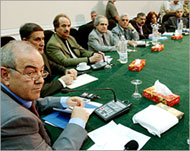Iraq wants say on end to occupation
Iraq’s interim foreign minister has told the UN Security Council his new government wanted US-led occupation troops to stay but said Baghdad needed some control over how long they would remain in the country.

In general, though, Hoshiyar Zebari sided with the United States and Britain on Thursday, thereby probably moving closer to the adoption of a US-British draft resolution on the planned “transfer of sovereignty” on 30 June.
He disagreed with France, Germany, China and others who want a fixed deadline for the force’s withdrawal. He also opposed a veto over US-led military operations.
“I stress that any premature departure of international troops would lead to chaos and the real possibility of a civil war in Iraq,” said Zebari.
The Iraqi minister was in New York to discuss the resolution that aims for international endorsement of the new interim government and authorisation of a US-led occupation force to remain in Iraq.
No fixed date
The draft resolution gives no date for a pullout of the 180,000 US-led occupation troops but says this would occur after a constitutionally elected permanent Iraqi government takes office, perhaps in early 2006.
|
“Can we run the risk of repeating the Falluja scenario?” Jean-Marc de la Sabliere, |
Zebari said Iraqi leaders should decide when foreign forces should leave.
“I think we are going to need these forces for some time, but as a sovereign government this cannot be open forever,” he said. “They are not going to stay indefinitely.”
However, he said a fixed date “would be very unhelpful” and be used by those who he claimed wanted “chaos to prevail”, adding that Iraqis could not handle security without occupation troops.
Right to block
No vote has been scheduled on the resolution but US and British officials would like one next week, although council members could delay this. US Ambassador John Negroponte said the text would still undergo some “fine-tuning”.
 |
|
The Iraqi interim government has |
Ambassadors from France, China and Algeria said Iraq should have the right to block major US military operations.
“Can we run the risk of repeating the Falluja scenario?” asked French envoy Jean-Marc de la Sabliere referring to a bloody US siege against the Iraqi town, a hotbed of resistance, which left hundreds of civilians dead.
Asked by reporters about a veto, Zebari said that was not a word he used as a military man who understood that one could not mastermind each action. However, “we should have a say in endorsing this kind of operation”, he said.
Zebari said the resolution needed to be “unambiguous” and allow the interim government to “have authority over security matters” and Iraq’s natural resources and other assets.
British Ambassador Emyr Jones Parry proposed an Iraqi “national security council” that would tackle major issues “and should work to get agreement on precisely how the force should carry out certain operations”.
This procedure is expected to be clarified in side letters rather than in the resolution text itself.
The Bush administration again made it clear the sovereignty it is offering would be subject to 138,000 American soldiers having the last word on essential military action in Iraq.